Raw materials
In focus
We focus on the following agricultural raw materials.
navigation
Raw materials
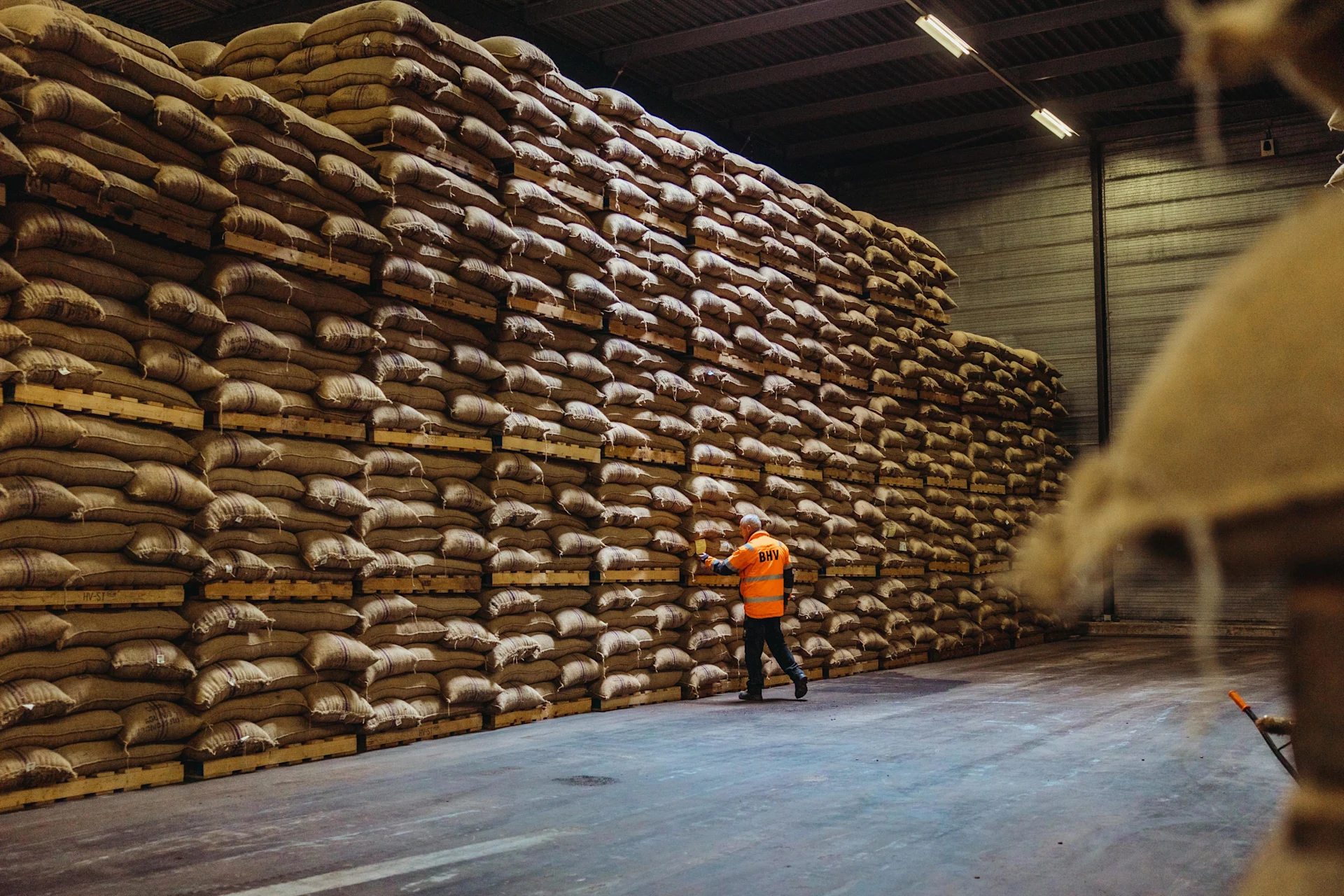
Raw materials form the basis for the production of all our products and services that are necessary for everyday life. They are therefore of central importance for all of the Migros Group’s business activities. We also have very different levels of impact on the environment and the people in the areas in which we operate, depending on the sector and raw material. Raw materials and substances were therefore identified as a key topic for us in our materiality analysis.
The greatest direct impact of our activities occurs through our core business: the production and distribution of food. That is why our first step is to create transparency across our agricultural raw materials.
Wherever possible, we aim to minimise our negative impact through the procurement of agricultural raw materials. That is why we work with “raw material strategies” for all major product groups in cooperative retailing. These include a precise analysis of our impact for each raw material, as well as clear guidelines on minimum requirements and added-value criteria. It is important to take all factors of raw material procurement into account, as the impact on the environment and people can vary greatly depending on the country of origin and production practices.
With the aid of these binding raw material strategies, we ensure that all our cooperative retailing and Migros Industrie buyers include specific raw material requirements in all product range decisions.
All strategic sustainability goals are included in the Group-wide annual Sustainability Report.
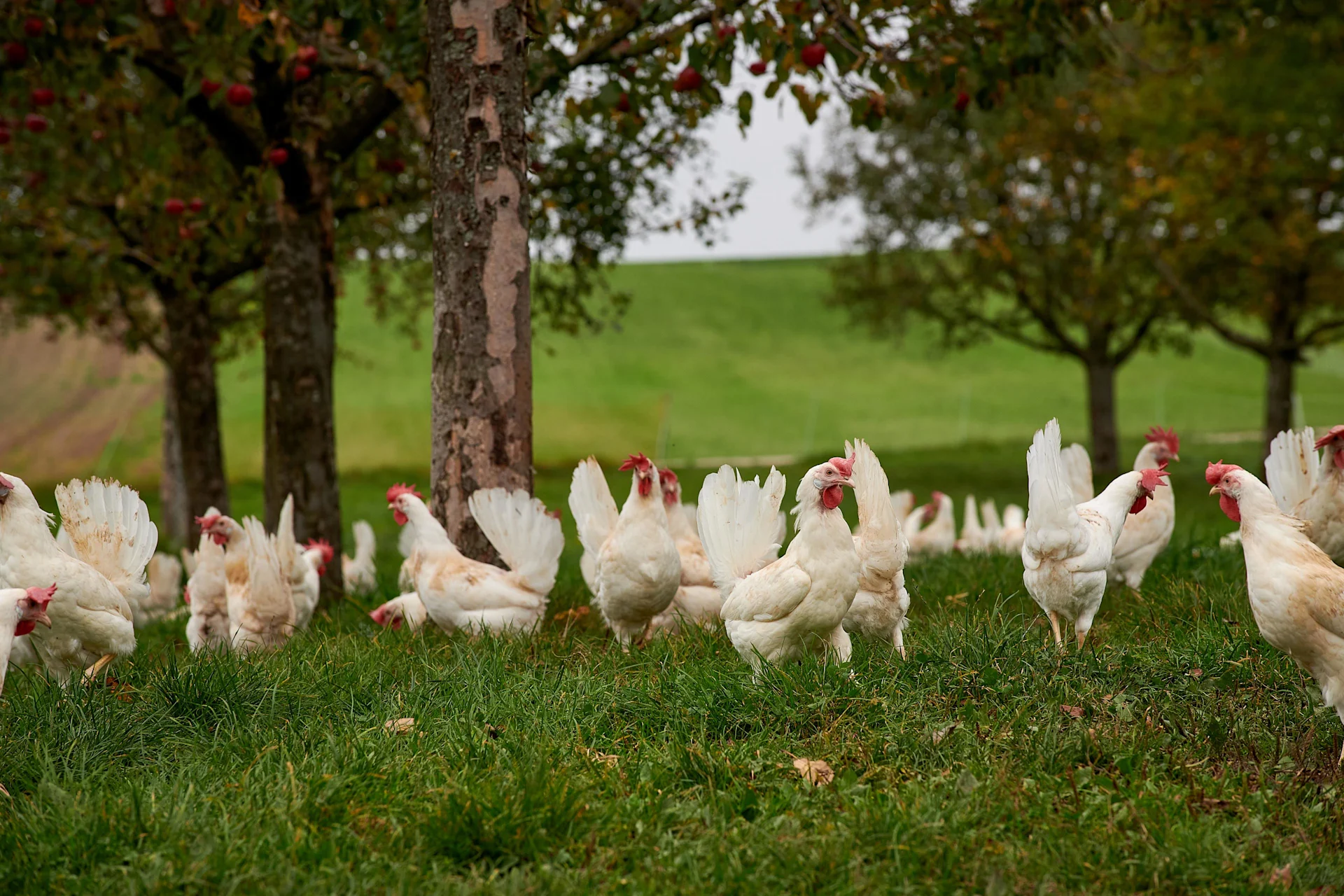
In Switzerland, one person consumes around 180 eggs a year, three quarters of which are shell eggs, while the rest are in processed products. Most eggs in Switzerland come from domestic production (79% of eggs and 69% of egg products). Around 3.6 million laying hens are needed to produce this quantity. To meet the total demand, the Swiss economy and Migros are also dependent on imports from Europe.
Eggs and egg products are considered a good source of high-quality proteins, vitamins (such as vitamins A, D, E and B12) and minerals (such as iron and zinc), supporting a balanced diet. However, egg production is also associated with various challenges for people and the environment.
Working conditions in production – the working conditions in Swiss agriculture are well regulated. In order to provide better social protection for women in agriculture, the federal government initiated the “Gender Equality Strategy 2023” in 2021 and defined its own measures. For non-family employees in Swiss agriculture, the Swiss Farmers’ Union, the Swiss Farmers’ and Rural Women’s Association and the ABLA (Swiss Consortium of Professional Associations of Agricultural Employees) publish annual wage guidelines. In other European countries, however, working conditions on farms can fall below the Swiss standard, for example with regard to working hours or social benefits.
Another issue when working on a laying hen farm is the health of the employees. Poultry farmers are exposed to dust, ammonia and potential pathogens in the barns, which can be transmitted from animals to humans. If preventative measures are insufficient, this could lead to respiratory diseases or infections.
Biodiversity and water – the production of eggs requires agricultural land for laying hen barns (including areas for free ranging) and the cultivation of feed. This can lead to land-use changes – one of the main causes of biodiversity loss. The cultivation of grains, soybeans and other components of feed for laying hens requires land, water, fertilisers and pesticides. In addition, cultivation can contribute to deforestation and other environmental impacts, as concentrated feed has to be imported due to insufficient quantities of domestic feed.
Climate and energy – soy imports have a major impact on greenhouse gas emissions in feed production. In addition, ammonia (NH₃) is produced by the chicken droppings, which can escape into the air. High ammonia concentrations can not only affect the air quality in the barn, but also lead to air pollution in the surrounding area. Under certain conditions, ammonia (NH₃) is converted to nitrous oxide (N₂O) – a potent greenhouse gas that is around 300 times more impactful on the climate than carbon dioxide (CO₂).
On laying hen farms, lighting, heating, ventilation and machine operation require electricity, the consumption of which can vary depending on the type of farming (conventional, free-range or organic) and the technology used.
On our own egg products, we transparently indicate the environmental impact of production via the M-Check climate compatibility.
With around 530 million eggs and egg products sold annually, Migros Industrie has a major influence on egg production. We always source shell eggs of Swiss origin from free-range farms in accordance with the IP-Suisse guidelines or from organic farms. For imported shell eggs, free-range schemes apply as a minimum standard. For our eggs, we use the ‘M-Check animal welfare’ to transparently show how appropriately the laying hens were kept. These free-range requirements also apply to egg products with a high egg content.
Animal welfare – in Switzerland, animal-friendly husbandry methods have been implemented almost everywhere thanks to the “High welfare livestock housing” (BTS) and “Regular outdoor management of livestock” (RAUS) schemes. Most Swiss laying hens are allowed out to pasture every day (RAUS proportion 2021: 85.5%) and almost all hens live in high-welfare housing (BTS proportion 2021: 93.4%).
There are also good schemes for eggs imported from Europe, such as the KAT free-range standard. However, alongside the good schemes in the EU, there are also forms of production with low animal welfare standards. For example, laying hens can be kept in the very restrictive so-called “enriched cages”. Furthermore, unlike Switzerland, the EU does not have maximum stock regulation. The health of many laying hens is also impaired by the one-sided, intensive breeding for laying performance, which can lead to diseases. Male chicks also have a rough time in egg production: they cannot lay eggs and produce too little meat for fattening. As a result, three million chicks are killed after hatching in Switzerland every year.
We use the ‘M-Check animal welfare’ on our eggs to transparently indicate how appropriately the laying hens were kept.
All Swiss shell eggs already come from free-range farms in accordance with IP-Suisse standards.
The long-term collaboration with IP-Suisse enables producers to pay fair price premiums for corresponding additional services in animal welfare, biodiversity, climate protection and resource efficiency. In accordance with Migros Group requirements, all Migros Group companies refrain from importing eggs from caged hens. At Migros supermarkets and hypermarkets, imported eggs and egg products with a high egg content must always meet the KAT free-range standard as a minimum. Imported KAT free-range eggs originate from Europe, and the standard ensures that the animals have daily access to pasture and the laying hen farms are subject to regular inspections, for example.
We support the industry solution to phase out chick culling. As of 2026, it will no longer be permissible to kill male chicks for Swiss egg production. For imported eggs compliant with the KAT standard, this rule already applies from 2024.
With the support of the M Climate Fund, we have been sourcing feed soy for laying hens exclusively from European areas since mid-2022. This ensures that biodiversity is preserved on the farms and delicate areas with natural vegetation are restored. In addition, certified farms apply good agricultural practice and operate nature-preserving systems wherever possible. No deforestation takes place for the cultivated areas, the soy does not come from pure monocultures, and the transport routes are significantly shorter.
Guidelines for greater animal welfare
Climate and energy strategy
Social standards
Environmental standards
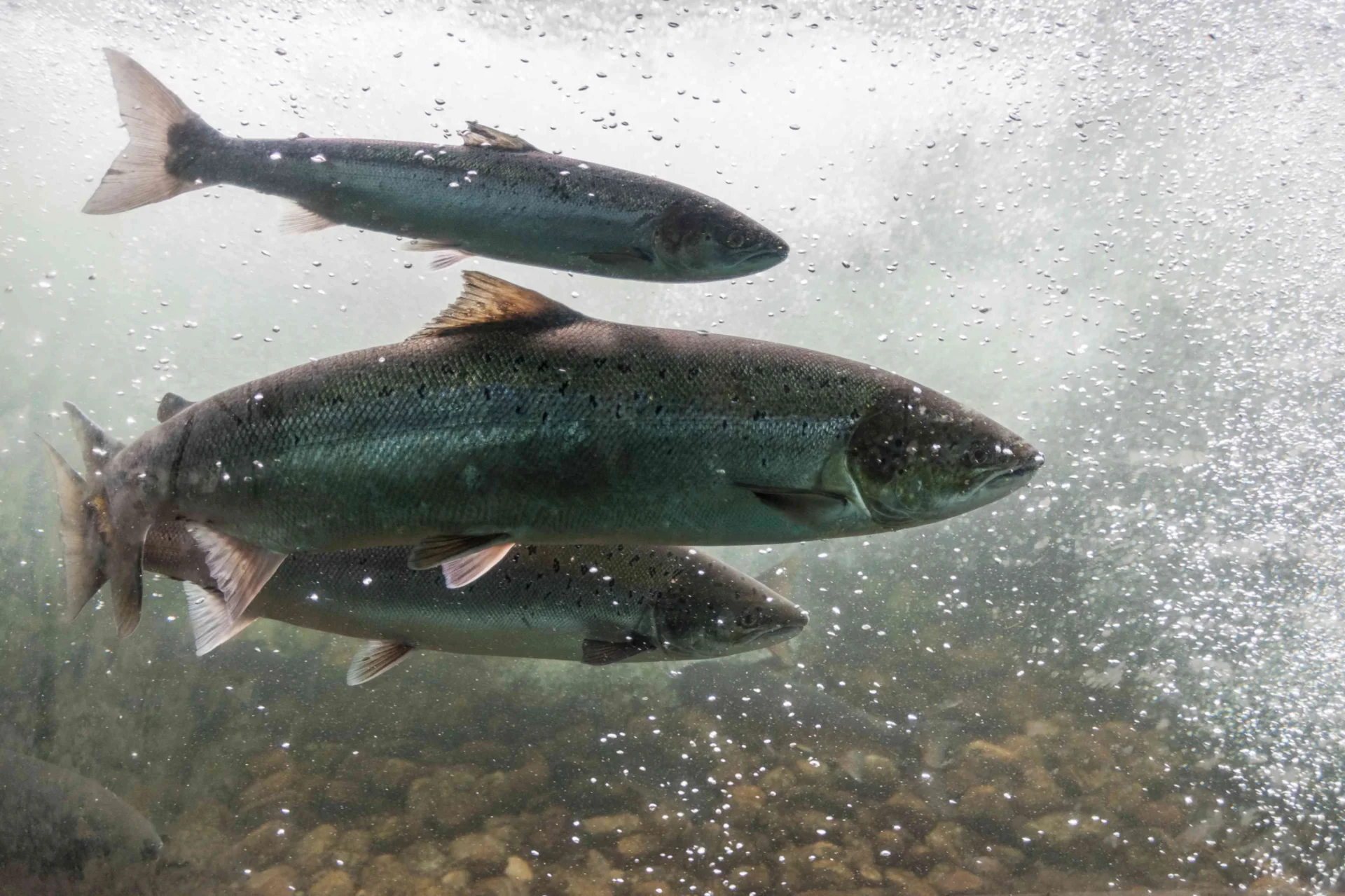
The international fish and seafood trade is complex, with a large number of stakeholders and sometimes highly multi-layered supply chains. In Switzerland, over 90% of fish and seafood is imported.
The fishery and aquaculture industry creates jobs and can strengthen the economies of many countries. In addition, fish and seafood are important sources of protein that contribute to food security, especially in coastal communities. However, the fishing industry is also associated with numerous challenges for people and the environment.
Wild-caught fish – overfishing is one of the biggest threats to biodiversity and the ecological balance of oceans and lakes, leading to a decline in fish levels and the loss of other marine life. When catching wild fish, few fishing methods are selective and gentle, such as handline fishing. Other fishing methods, such as bottom trawling, have a negative impact on habitats and ecosystems. They also often cause a lot of bycatch, i.e. non-target species, juveniles or protected species. The majority of this bycatch dies and is thrown overboard. The overexploitation of fish populations and industrial fishing can threaten the livelihoods of coastal communities that are heavily dependent on fishing. The increasing trade in products from industrial fisheries leads to the marginalisation of small-scale fisheries, which can lead to poverty, food insecurity and local social conflict. Other negative consequences of wild-catch fishing include marine pollution from lost nets and equipment, plastic waste, and high greenhouse gas emissions from fishing vessels.
Aquaculture (farming) – fish farming poses actual and potential risks to the environment: pollution of bodies of water with feed residues and chemicals, release of waste, transmission of diseases to wild fish, overuse of water, salinisation of freshwater sources, and loss of genetic diversity. These factors mean that ecosystems can no longer adapt to diseases and environmental changes. Feed for aquaculture can also cause environmental problems, for example if it is made from fishmeal and oil derived from overfished wild fish populations, or if it is produced from land-based crops such as soy, which can contribute to deforestation.
Animal welfare – the welfare of fish and seafood is a complex matter. There are few regulated guidelines, and proper handling depends heavily on the type of fish, the production method and the conditions under which the animals are caught or kept.
Working conditions and human rights – in some cases, working conditions in the fishing industry are precarious. Exploitation, lack of safety and human rights violations (such as slavery, forced labour and human trafficking) are real challenges, especially on deep-sea fishing vessels and in regions with insufficient regulation. A lack of transparency, lack of traceability and corruption in the supply chain exacerbate the problem.
To overcome these challenges, the Migros Group is guided by the following vision: “In the Migros Group, we only sell fish and seafood that is fished and produced in such a way that wild populations and ecosystems are preserved in the long term and socially responsible working conditions are observed along the supply chain.”
The procurement of fish and seafood from responsible sources is therefore anchored in the Migros Group requirements, which must be implemented by all Migros Group companies.
In order to continuously improve our product range with regard to sustainability, we have set ourselves ambitious targets. The fulfilment of these targets is reviewed periodically, while the results of our efforts to achieve a responsible fish range are published in detail by the Ocean Disclosure Project:
Ocean Disclosure Project profile Migros Group
Ocean Disclosure Project profile Migros supermarkets
In our procurement guidelines, we have enshrined the fact that the Migros Group only trades in fish and seafood from ecologically responsible fisheries and farms. To implement this standard, all fisheries and farms that work with the Migros Group are assessed according to the same criteria. This applies to both conventional and certified products. To this end, we have developed the M-Check fish from responsible sources together with our independent partner Sustainable Fisheries Partnership (SFP). SFP works according to scientific principles, relies on scientific sources and attaches great importance to transparency. All assessment criteria, their weighting, the data used and the actual assessments can be viewed on the FishSource website. The M-Check rating directly on our product makes the assessment transparent for our customers.
The Migros Group only trades in products that are rated with two or more stars in the M-Check for fish and seafood from responsible sources. Products with one M-Check star are therefore not sold at all within the Migros Group.
SFP updates its data for the M-Check on an ongoing basis and informs us of any changes so that the M-Check can be updated accordingly. The dynamics of fish populations and other relevant changes are taken into account via an annual review of the product ranges. If products are only rated with one M-Check star, the existing orders may still be sold but the products must then be replaced by alternatives or discontinued.
In addition to SFP, we work with other partners such as the International Pole and Line Foundation (IPNLF) and Community Catch. Further information on our collaborations.
Social sustainability is ensured in the Migros Group through cooperation with the amfori BSCI initiative and, for suppliers of wild-caught fish, through a self-declaration. More information on our social standards.
No fish or seafood belonging to endangered species according to the IUCN (International Union for Conservation of Nature) must ever be procured and sold. In accordance with the regulation on the import of fish, we also do not sell fish or seafood from illegal, undocumented or uncontrolled catching operations.
Furthermore, we categorically refrain from selling the following endangered species:
Sharks of any species or products made from sharks
Sea turtles or products made from sea turtles
Marine mammals of any species or products made from marine mammals
Wild-caught sturgeons or products made from wild-caught sturgeons
Rays and sawfish of any species or products made from rays and sawfish
Eels
Octopus/squid from aquaculture
The following product groups are subject to additional requirements because their procurement is associated with greater risks:
Cephalopods (squid): our suppliers must disclose all supply chains in detail and transparently. Our suppliers (or the involved EU importers) actively participate in industry round table talks aimed at making improvements in the sector. We conduct periodic spot checks to verify the information provided and identify any risks so that they can be reduced in a targeted way.
For Migros supermarkets, Migros restaurants and take-aways, and Denner, stricter criteria are applied than those mentioned above: these companies also follow the publicly accessible WWF Fish Guide and aim to avoid sources that are rated as red (“hands off”).
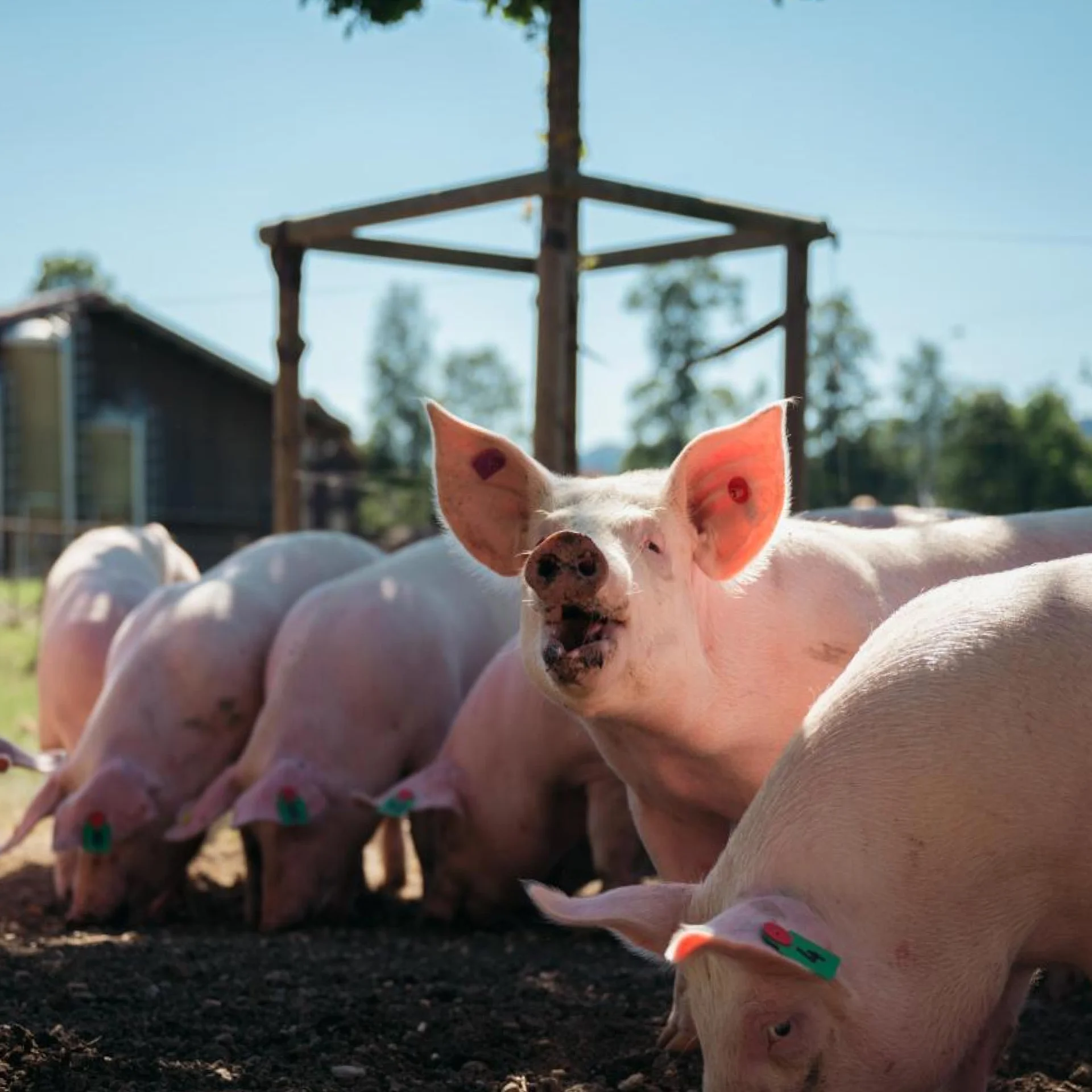
At around 51 kg per person per year, the Swiss population eats significantly more meat than the global average (approx. 28 kg). In recent years, however, the demand for meat has remained constant and the 82% proportion of domestic meat has hardly changed. Meat can be an important source of nutrients such as proteins, vitamins and minerals, and can contribute to a balanced diet in appropriate quantities. In addition, the meat industry creates jobs and contributes to economic development. However, meat production is also associated with various challenges for people and the environment.
Working conditions and human rights – working in the meat industry can be very physically demanding, and the handling of sharp tools and machinery, contact with animals and the use of chemicals increase the risk of accidents and health-related issues. In many regions of the world, the meat industry is rife with precarious working conditions and low wages. Many workers are not adequately protected and have little influence on their working conditions. In addition, many workers do not have sufficient access to social rights (e.g. health insurance) or trade unions.
Climate and energy – livestock farming, especially cattle farming, generates a significant amount of potent greenhouse gases (methane). This exacerbates climate change. Deforestation for pasture and fodder crops and the use of fertilisers also lead to the release of greenhouse gases. Meat production also requires large amounts of energy for the operation of barns, cooling, transport and processing.
Biodiversity and water – meat production requires large areas of pasture and land for growing animal feed (such as soy), which can lead to deforestation. Deforestation not only releases large amounts of stored carbon, but also reduces global carbon reservoirs. In addition, animal feed cultivation competes with food production for humans. Intensive livestock systems can lead to soil erosion, especially in areas where large numbers of livestock are kept in confined spaces. Overgrazing and the accumulation of animal excrement can deplete the soil and reduce its fertility.
Intensive livestock farming pollutes water resources in various ways: firstly, it consumes a lot of water for the irrigation of grazing land and the cultivation of animal feed; in addition, it pollutes the water through the use of fertilisers and the disposal of animal excrement. This can lead to over-fertilisation of soils and bodies of water and thus have a negative impact on water quality and the ecosystem.
Animal welfare – intensive animal husbandry can be associated with animal suffering and violations of animal rights. Relevant factors here include the type of husbandry, animal health, transportation and the slaughter process.
Consumer health – studies have shown that excessive meat consumption can increase the risk of cardiovascular disease, obesity and some types of cancer. In addition, the use of antibiotics in animal husbandry can promote the development of antibiotic-resistant bacteria.
In Switzerland, the Micarna Group, a Migros Industrie company, slaughters around 65,000 cattle, 33,000 calves, 634,000 pigs, 7,900 lambs and 35 million broiler chickens every year. We are aware of our responsibility and pursue specific strategies along the entire value chain to minimise the impact on people and the environment.
With our climate targets, we are committed to reducing greenhouse gas emissions both in our own operations and in agricultural production.
As of 2016, the Micarna Group sources exclusively European soy as feed for its Optigal chickens. This reduces the negative impact of animal feed on the climate and biodiversity: no deforestation takes place for the cultivation land, the soy does not come from pure monocultures, and the transport routes are significantly shorter.
In order to minimise our negative impact on the environment from our own operations, all Migros Industrie companies are ISO 14001-certified and have thus implemented a professional environmental management system.
For poultry meat, Micarna has its own integrated supply chain for broiler chickens, including the slaughterhouse, where it is able to implement sustainability projects such as the fossil-free chicken fattening halls or the slaughterhouse newbuild with a new, gentle anaesthesia system and efficient use of resources and energy.
For Swiss cattle, pigs, lambs and rabbits, we work closely and bindingly with partners such as IP-Suisse and Bio-Suisse, whose schemes for animals guarantee controlled animal welfare standards as well as biodiversity, nitrogen reduction and climate protection provisions. Schemes with particularly high animal welfare standards are also promoted via the Swiss labels Wiesenschwein and Swiss Black Angus.
For our imported meat (beef, pork, horse, rabbit and lamb), we have defined minimum requirements in the Migros raw material strategies as well as value-added criteria for individual schemes for suppliers. We take into account both animal welfare and ecological conditions in the countries of origin.
The employees of the Micarna Group in Switzerland are subject to the Migros L-GAV (collective labour agreement).
Working conditions abroad are more difficult to monitor. Compliance with social standards is implemented in this case via the amfori BSCI initiative. More about our commitment to high social standards.
In addition to our own procurement principles, we rely on our customers’ responsibility to reduce the overall impact of meat consumption, which is why we use the M-Check on our own meat products to provide transparent information about animal welfare and the impact on the climate.
Migros recommends that its customers consume meat sensibly. Migros is also actively promoting the development, production and sale of vegan meat substitutes. With the steady expansion of the V-Love range, Migros is fulfilling its responsibility to diversify protein sources.
Migros is also a pioneer in the field of cultured meat, where it is working with Aleph Farm to develop and launch cultured meat on the market.
Climate & Energy Strategy
Strategy Product range & services
Animal welfare
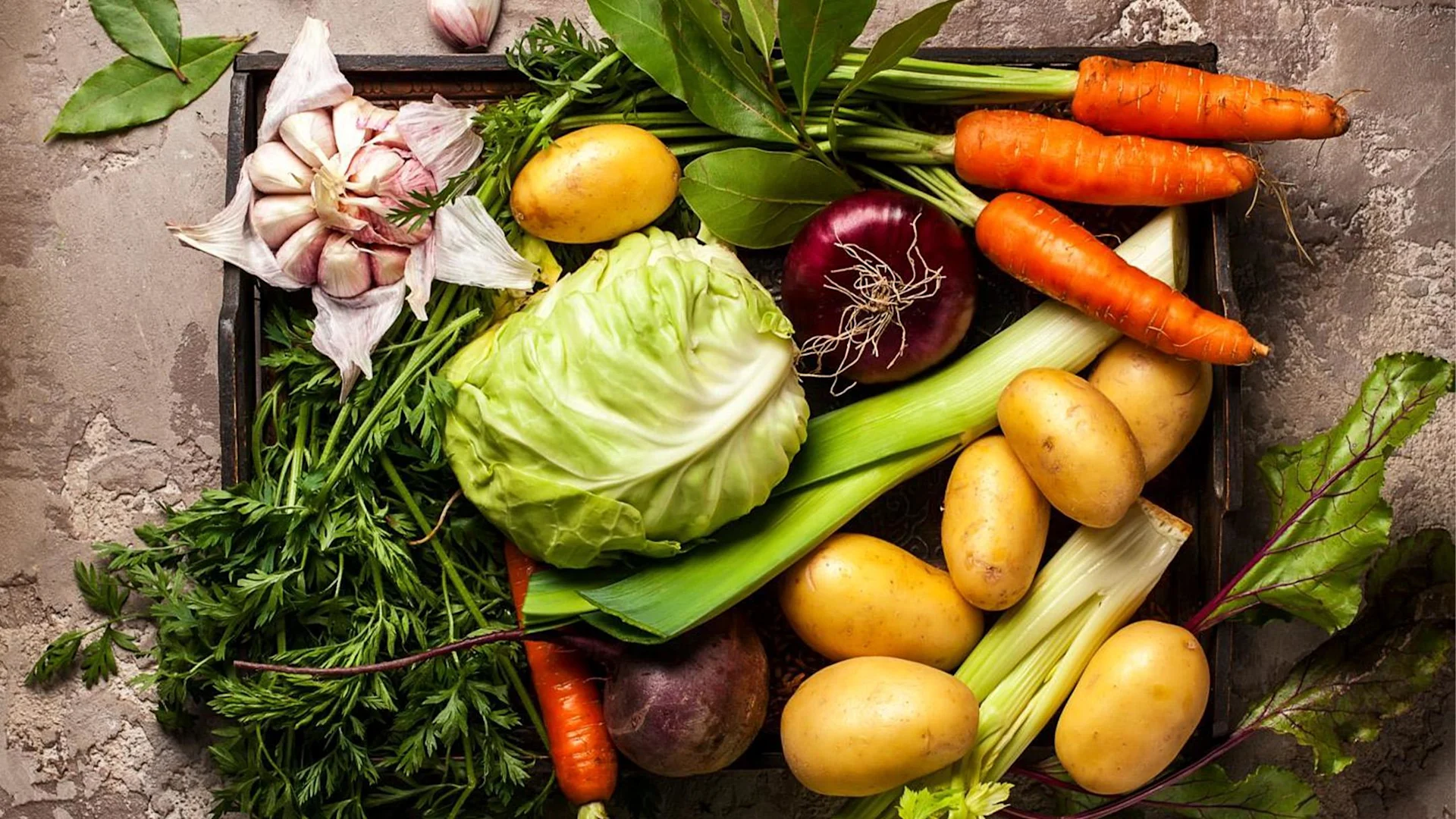
Fruit and vegetables are important elements of a healthy diet. They provide not only vitamins, minerals and fibre, but also secondary plant substances that can protect against various diseases.
Thanks to Switzerland’s geographical diversity and distinct seasons, many types of fruit and vegetables can be grown regionally. Switzerland attaches great importance to the quality of its agricultural products. Many domestic producers practice sustainable agriculture, and strict standards are in place for the use of pesticides and fertilisers. Despite local production, many fruits and vegetables are also imported into Switzerland to meet demand throughout the year. The impact of fruit and vegetable production on people and the environment depends on the product and the growing region.
Working conditions in production countries – fruit and vegetable cultivation is a very labour-intensive activity that still requires a lot of manual work. This tends to attract unskilled, often vulnerable groups such as migrants. Workers are often paid low wages and are exposed to health risks (e.g. through the use of pesticides without suitable protective equipment).
Water and biodiversity – fruit and vegetables are often grown in monocultures, which offer little living space for other plants and animals and threaten biodiversity. The use of pesticides to control pests further increases the pressure on biodiversity. Spreading fertilisers on fields can lead to nutrients being washed out and entering the groundwater, contributing to over-fertilisation of bodies of water and acidification of the soil. Fruit and vegetables are often grown in water-critical areas, and water shortages can lead to crop failures, loss of quality and higher costs. In addition, the local population may suffer negative consequences if the water supply is affected or contaminated (e.g. through the use of pesticides).
Climate and energy – the place of origin, season and type of production have a huge influence on the climate footprint of fruit and vegetables, with considerable variation between the same varieties. As a rule, fruit and vegetables have a smaller climate footprint than most animal products, with the exception of goods transported by air and vegetables from greenhouses heated with fossil fuels. Seasonal products always have the smallest climate footprint. In addition to avoiding air transport, road transport routes in particular should be kept as short as possible.
Food waste – fluctuating crop yields, the appearance of products, the standardisation of sizes and shapes, and the high quality demands of customers contribute to food waste in production and sales. This waste has a negative impact on the environment, the economy and global food security.
We are aware of the potential negative impacts of our business activities and therefore take various measures to minimise them. The following minimum requirements for responsible agricultural practices and appropriate working conditions apply to the entire Migros Group:
The Migros Group procures fresh fruit, vegetables and potatoes as well as flowers and plants from abroad exclusively from GlobalGAP-certified producers. SwissGAP applies in the case of fresh products from Switzerland.
Fruit, vegetables and potatoes from abroad that end up in the Migros Group’s products in processed form must at least comply with the GlobalGAP Crops for Processing standard.
The Migros Group procures fresh fruit, vegetables, potatoes and fresh herbs from medium-risk countries of origin according to the World Governance Indicators (e.g. Spain or Italy) exclusively from GlobalGAP-GRASP monitored producers. GRASP is an additional module to GlobalGAP used to assess the working conditions on a farm.
All suppliers must comply with the minimum social requirements of the amfori BSCI Code of Conduct for both cultivation and processing; equivalent social standards are also recognised.
More on GlobalGAP and GlobalGAP-GRASP.
In cooperative retailing, we go one step further and source fruit and vegetables from Switzerland whenever possible. For example, more than 90% of the apples in Migros supermarkets come from Switzerland. In order to offer our customers a varied selection all year round, we also rely on imports from abroad. The majority of foreign products come from South America (bananas), Spain and Italy.
We use a risk-based approach so that we can minimise the potential negative effects in cultivation. As a first step, we identify the greatest risks for people and the environment in our supply chains using what we call hotspot analyses. These risks depend on the product, the country of origin and the production methods. For the products with the greatest risk, we procure certified products that have been produced according to standards that go beyond our minimum requirements. Depending on the product, these include labels such as IP-Suisse, Rainforest Alliance or organic.
For particularly critical product groups (e.g. Swiss pome fruit, strawberries from Spain), we also run our own projects to establish sustainable production. Together with our local producers, we develop specific requirements for production and support them in implementing these. The implementation of these requirements is regularly reviewed with the help of external inspection bodies, and the projects are monitored by external experts. For other critical product groups, we support partner projects such as the WWF project for more responsible banana cultivation.
In order to further reduce the comparatively low climate impact of fruit and vegetables, air transport will be gradually reduced in line with a defined reduction path and greenhouses will be heated without the use of fossil fuels by 2025. Goods transported by air currently only account for around 1% of the fruit and vegetables on offer in Migros supermarkets.
Environmental standards
Social standards
Strategy Product range & services
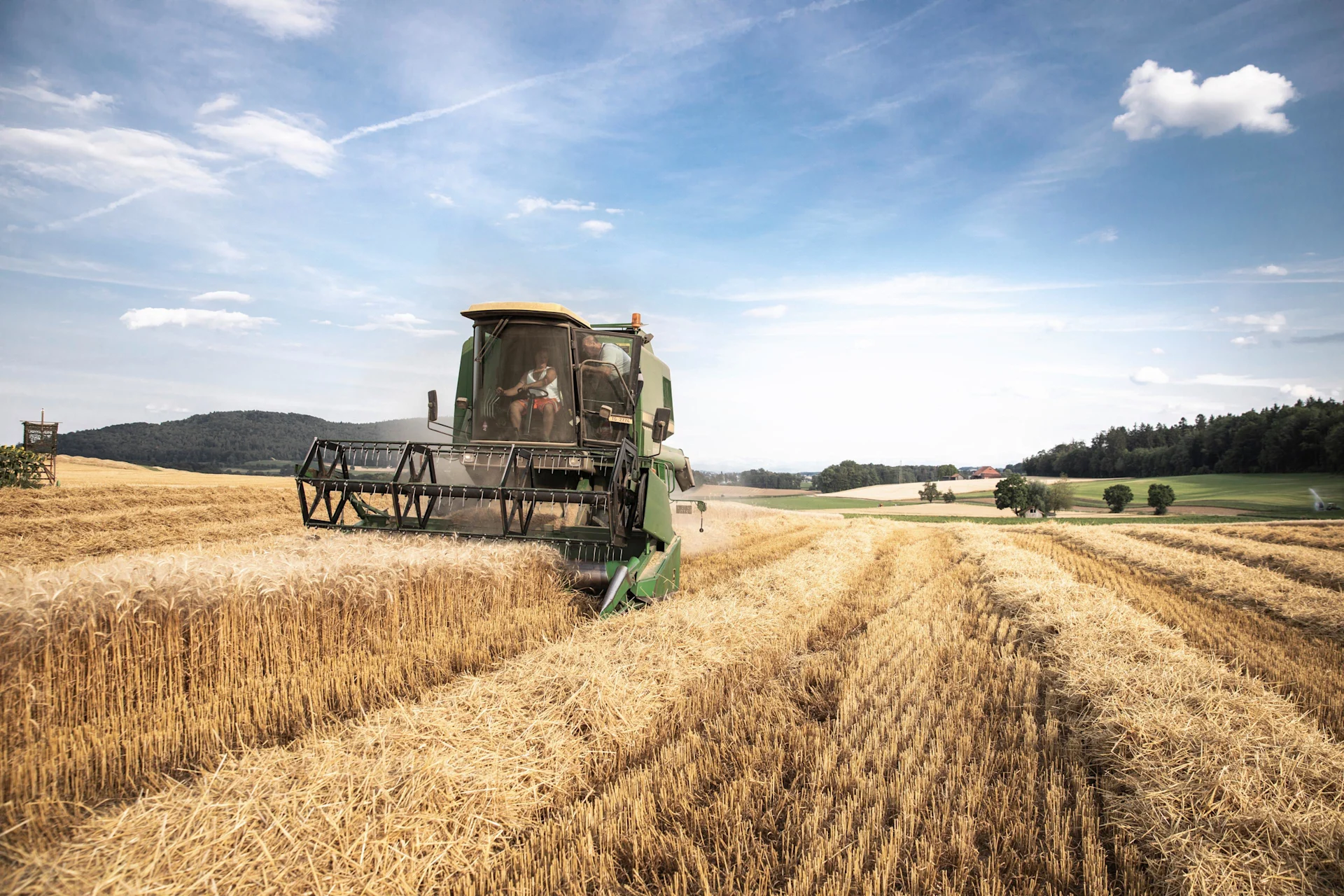
Grains and grain products are the most important source of nutrition for humans and animals worldwide. They contain very little fat, but are rich in essential fatty acids. In Switzerland, around 140,000 hectares of land are used for the cultivation of bread and feed grain, which corresponds to around 14% of agricultural land. Most of the bread grain that is processed into flour in Switzerland comes from domestic production. The level of impact on people and the environment within the country and abroad varies.
Biodiversity and water – the intensive cultivation of grains can lead to soil erosion and degradation, especially if sustainable farming practices are not implemented. The loss of fertile soils affects the long-term sustainability of agriculture. Grain cultivation can promote deforestation, habitat destruction and losses in species diversity when grown at the expense of natural ecosystems. The use of fertilisers and pesticides can also result in pollution of water resources, biodiversity degradation and risks to human health. Grain cultivation requires significant amounts of water, especially in irrigation practices, leading to potential water stress in regions where water availability is limited.
Climate and energy – agricultural activities in grain cultivation can contribute to greenhouse gas emissions, whether through the use of fertilisers, the production of pesticides or the use of machinery.
Working conditions and human rights – modern, industrialised grain cultivation can involve intense work, especially during the harvest season. This leads to high workloads and unsafe working conditions for farm workers. Social standards are maintained and continuously developed in cultivation according to IP-Suisse standards as well as in organic cultivation.
Large-scale grain cultivation can lead to land conflicts and land usage problems, especially when large companies acquire land for cultivation and displace local communities in the process.
Migros Industrie processes around 120,000 tonnes of Swiss grain every year. Some 98% of the processed flour comes from Switzerland and is certified. For some special products (e.g. durum wheat) we have to resort to imports, as these cannot be grown in Switzerland or are not of the required quality.
We have maintained a close partnership with IP-Suisse for 25 years and continue developing together to meet our customers’ high standards for baked goods, sustainability and environmental protection. IP-Suisse does not use any insecticides, fungicides or height restrictors in grain cultivation. The aim is to stop using herbicides by 2024 for 100% pesticide-free wheat in the future. This is already the case for 6% of our grain today.
The next step is to focus on regenerative agriculture, which aims to improve soil quality, combat climate change and ensure food security. To achieve these goals, however, we must first define what regenerative agriculture means in the context of Switzerland, how we can implement it and how the impact on people, and the environment can be measured. We want take this path together with our partners and develop innovative solutions based on scientific findings in collaboration with research institutions. We believe that we are already able to apply many elements of regenerative agriculture with IP-Suisse and can expand them further.
More about the IP-Suisse guidelines
More about our research collaboration
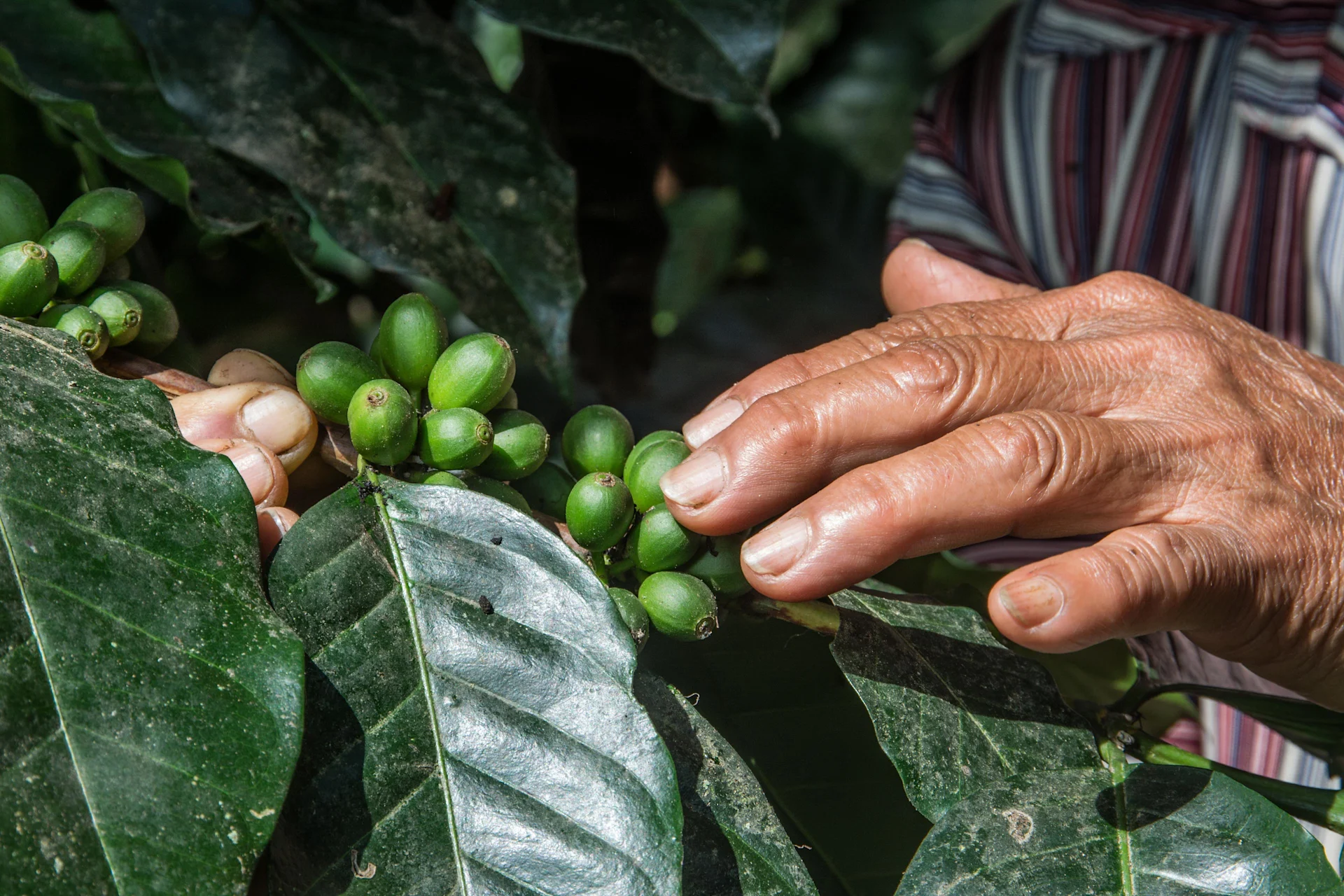
Coffee is an important raw material that is traded worldwide in large quantities and with a high value. Global demand for coffee is high and growing steadily. The key consumers are the USA and Europe. Some 70% of the world’s coffee beans come from four countries – Brazil, Vietnam, Colombia and Indonesia – and are mainly grown by smallholder families, often on small plots measuring less than 10 hectares. Coffee farming is a major – and often the only – source of income for millions of people in these countries. Coffee production involves intense manual labour and little to no use of modern machinery and equipment (with the exception of Brazil). Conventional coffee supply chains have a variety of stakeholders, including farm suppliers, farmers, various intermediaries, the food industry and retailers. These complex supply chains make traceability difficult.
The inequality of power in the coffee trade is clearly evident in the unequal distribution of revenue, which predominantly favours green coffee traders, big international brands and retailers’ own brands. These stakeholders control the majority of the value chain, resulting in significant profits on their side. Coffee producers receive only a small share of the final price of coffee, leading to considerable power inequality within the industry and contributing to producer poverty.
Poverty is particularly prevalent among smallholder coffee farmers and is further driven by fluctuating coffee prices, limited market knowledge, insufficient access to financing options and rising production costs. Many people are forced to take on debt to meet their basic needs and thus fall into a “poverty trap”.
Against this backdrop, the relevance of a liveable income for coffee producers in the sector is increasingly being emphasised and promoted. This should cover not only the costs of basic necessities such as food, water and shelter, but also enable funds for education, medical care, transportation, clothing and reserves for emergency situations.
The productivity of coffee plants is negatively affected by disease or pest infestation, plant aging and environmental damage. Improvement requires a constant rejuvenation of the coffee farm with young and more resilient plants. The possibility of rejuvenation is hampered by the limited financial resources of coffee producers, their limited access to financing as well as labour shortages, thus exacerbating low productivity.
The risk of child labour in the coffee sector is moderate to high, depending on the country of production, and increases in areas where it is difficult to find workers or reduce costs in the face of rising wages for agricultural workers. Coffee producers also suffer from poor working conditions and limited access to health measures, which can lead to respiratory diseases and other health problems.
With regard to gender equality, it is clear that women do most of the work but are often paid the least. Land ownership is rare for women, which further exacerbates existing inequalities in the industry. All of these challenges underscore the need to make the global coffee economy fairer and more sustainable.
The historic expansion of coffee cultivation and the modernisation of farms are still causing serious ecological consequences today. The clearing of shade trees in the course of expansion leads to a loss of ecosystem services and contributes to deforestation and the spread of monocultures. This not only has a negative impact on biodiversity, but also endangers the stability and resilience of the affected ecosystems.
The increased use of fertilisers and pesticides in some coffee supply chains to increase yields and control disease can have a significant impact on soil and water quality. The accumulation of chemicals can disrupt ecological balances and threaten livelihoods in production areas.
Furthermore, deforestation, land conversion and some fertiliser use contribute to high greenhouse gas emissions in coffee cultivation, which in turn contribute to climate change and increase the environmental impact of coffee production.
Worryingly, coffee is often grown in countries that are already suffering from the tangible effects of climate change. These regions are increasingly affected by extreme weather events, further jeopardising coffee production and affecting the livelihoods of local communities.
Owing to climate change, it is expected that by 2050 significant parts of the land used for coffee cultivation will have become unsuitable. This particularly affects the cultivation of Arabica coffee.
The growing importance of preserving forests and reducing emissions on the global political agenda is also visible in the coffee sector, whereby the implementation of many measures is being promoted at private and public level.
With the production and sale of coffee products, we have a major influence on the impact of the coffee supply chain. Some 95% of the coffee products sold in Migros supermarkets are procured via our own producer. We therefore have a key responsibility to tackle the challenges in the coffee supply chain and to better promote opportunities for sustainable coffee production.
We are committed to transparency along our supply chain and rely on credible and independent certifications such as Rainforest Alliance, Fairtrade Max Havelaar and organic. For Migros own brands, over 90% of our coffee is certified, and we aim to further increase this proportion. Regular visits to the coffee production countries of origin, close communication with supply chain partners and cooperation with independent organisations enable us to better understand the context and reality of the producers and to effectively ensure the implementation of sustainability standards. For our own brand Café Royal, we go one step further and work directly and personally with the coffee farmers as part of our “Impact partnerships”. More about our sustainability impact with our Café Royal brand.
Together with Delica, our supplier ECOM Agroindustrial Corp. Ltd. and the IDH Foundation, Migros is researching possible approaches and measures to support small farmers in achieving a liveable income. More about the project “Bridging Living Income in Colombia”.
We have set ourselves science-based targets in the area of climate protection. These also apply to the greenhouse gas emissions generated within our supply chain. Coffee cultivation in the country of production generates a relevant proportion of the total greenhouse gas emissions from agriculture. More information on our climate and energy targets.
For Café Royal, we have had the entire CO₂ footprint calculated, from coffee cultivation, transport and production to the use and disposal of coffee capsules. On our own initiative, but also together with external partners (including myclimate), we are working on measures to reduce these emissions along our supply chain and in our production.
We are also committed to preventing the deforestation and conversion of forests and other intact ecosystems along the entire value chain. We pursue this goal in accordance with the European Union Deforestation Regulation (EUDR). More about our commitment to deforestation-free supply chains.
With CoffeeB, we have launched an innovative coffee capsule on the market that is made from 100% renewable materials.
We are also a founding member of Swiss Aluminium Capsule Recycling (SACR) and are actively involved with other market players in increasing the collection and recycling rate of aluminium capsules and pods in Switzerland.
More about sustainable coffee at Migros
Our guidelines for social standards
Our guidelines for environmental standards
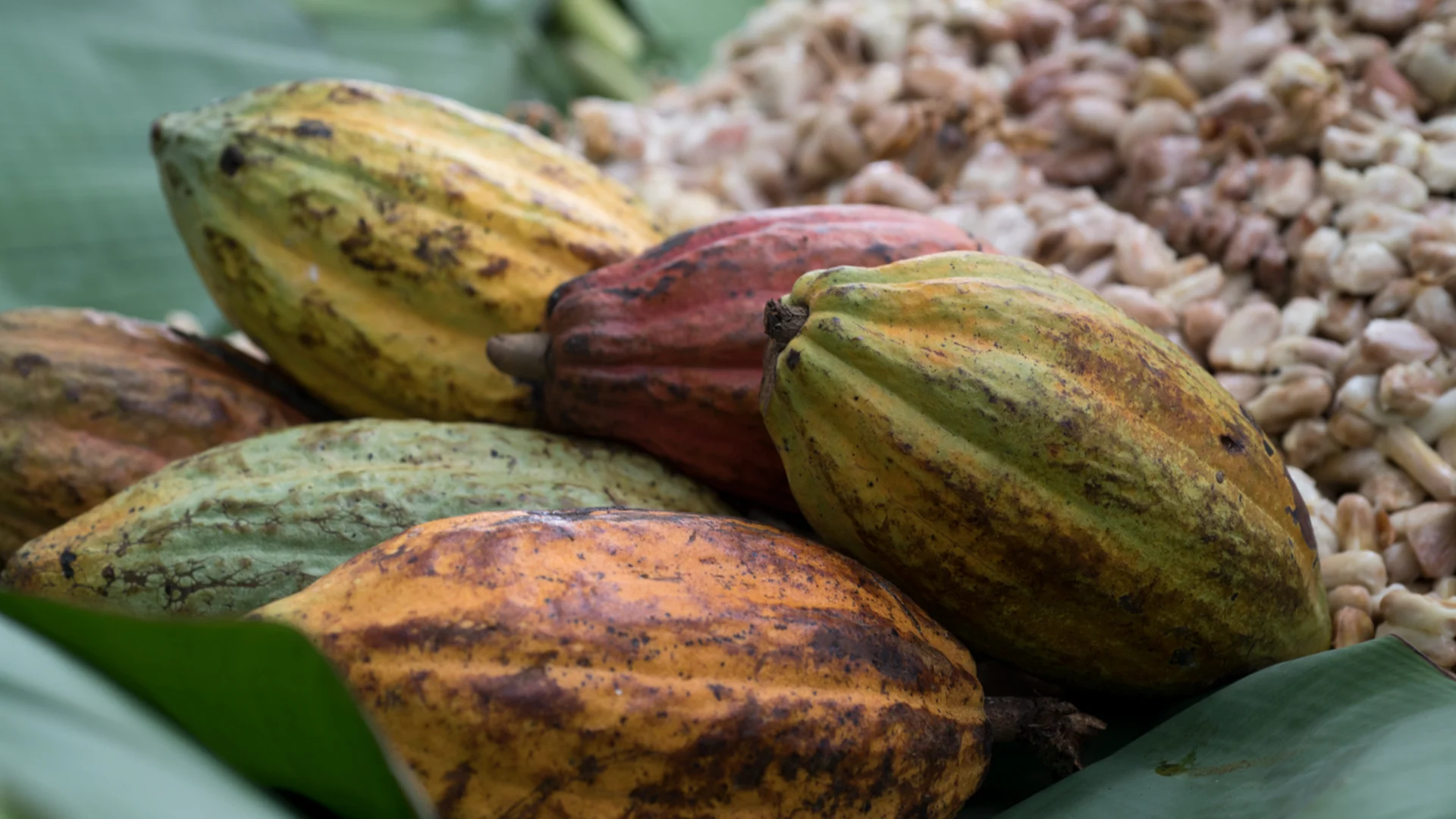
Cocoa is obtained from the seeds of the cocoa tree and is usually used to make chocolate. The cocoa sector contributes to the livelihoods of up to 50 million people worldwide. The majority of cocoa is produced by 5–6 million smallholder farmers with small plots of land (2 to 5 hectares). The main producing countries are the Ivory Coast and Ghana. After harvesting, the cocoa beans are fermented, dried and ground into cocoa mass, which can be divided into cocoa butter and cocoa powder. These three products – cocoa mass, butter and powder – are essential raw materials for the production of chocolate.
Working conditions and human rights – the cocoa industry faces numerous challenges that exacerbate poverty and inadequate living conditions in the producing countries. The low prices for cocoa often do not allow producers to earn a liveable income. In addition, the low yields and cultivated areas cause producers to constantly plant new areas with cocoa.
The issue of child labour is closely linked to the low incomes of families. Due to a lack of financial resources for external labour or school fees, many children have to help on the cocoa farms, putting their physical and mental health at risk. It is estimated that around 1.6 million children in Ivory Coast and Ghana work on their families’ cocoa farms.
Lack of access to financial services is another hurdle – many farmers do not have access to financial investment systems, loans or microcredit, which are crucial for investing in productivity, quality and market access.
The inadequate infrastructure further exacerbates the situation. An inadequate road network makes it more expensive to transport the harvest and makes farmers dependent on middlemen who handle the transportation for a fee, thus further reducing their income. In addition, many families have no or only limited access to clean drinking water and sanitary facilities.
Biodiversity and water – in many countries, cocoa production is threatened by ageing tree populations, inadequate cultivation, declining soil fertility, pests and diseases.
To increase production and meet demand, cocoa producers often resort to clearing additional forest areas. This has a negative impact on biodiversity and the ecosystem.
The excessive use of pesticides and chemical fertilisers in cocoa cultivation impairs the water quality, contaminates soils and impairs biodiversity.
Climate and energy – cocoa is often grown in regions that suffer greatly from the effects of climate change and experience extreme weather events.
If rainforests are cleared for cocoa cultivation, cocoa also becomes a driver of climate change. Conversely, by converting existing cocoa monocultures into species-rich agroforestry systems, carbon dioxide can be stored and thus contribute to climate protection.
To tackle the impact of cocoa cultivation on people and the environment, we have defined clear minimum requirements for sustainability in our cocoa raw material strategy. In particular, we rely on independent certifications. For the procurement of cocoa (beans, butter, powder) for our own brands produced by Delica, we aim to achieve full certification and physical traceability by 2025 (butter and powder by 2026). This is based on binding agreements with suppliers which we review on an ongoing basis and amend as required. The cocoa and all cocoa components used in the production of chocolate and other Frey brand products are already certified to at least one of the standards Rainforest Alliance, Bio Suisse or Fairtrade Max Havelaar. Delica also aims to ensure all the countries from which it sources cocoa are covered by sustainability programmes by 2030.
We have also committed to preventing deforestation and the conversion of forests and other intact ecosystems throughout the value chain. We are also involved in networks such as the Swiss Platform for Sustainable Cocoa.
We have set ourselves science-based targets in the area of climate protection. These also apply to the greenhouse gas emissions generated within our supply chain. Cocoa cultivation in the country of production generates a relevant proportion of the total greenhouse gas emissions from agriculture. More information on our climate and energy targets.
We have maintained a partnership with the Necaayo cooperative, from which around 20% of the cocoa beans processed by Migros Industrie originate, since 2012. In collaboration with Necaayo, we have implemented various projects to improve the infrastructure and living conditions of the cooperative members. The Rainforest Alliance award, half of which is paid directly to the cocoa farmers, with the other half being used to strengthen the cooperative and for social projects, has already enabled the construction of water pumps, school buildings and a health clinic.
With the launch of the CÔTE D’IVOIRE chocolate line, an additional 50 centimes per bar sold is invested in social projects. In autumn 2023, these funds were used to purchase school materials for 1,000 pupils. Building schools and providing pupils with materials effectively supports access to education for the children of the Necaayo cooperative.
For our CÔTE D’IVOIRE chocolate, which contains only cocoa beans from the Necaayo cooperative, we have priced all emissions over the entire life cycle. We use this internal steering tax to finance climate protection projects along our supply chains, such as the introduction of the dynamic agroforestry system in our partner cooperative Necaayo in Ivory Coast.
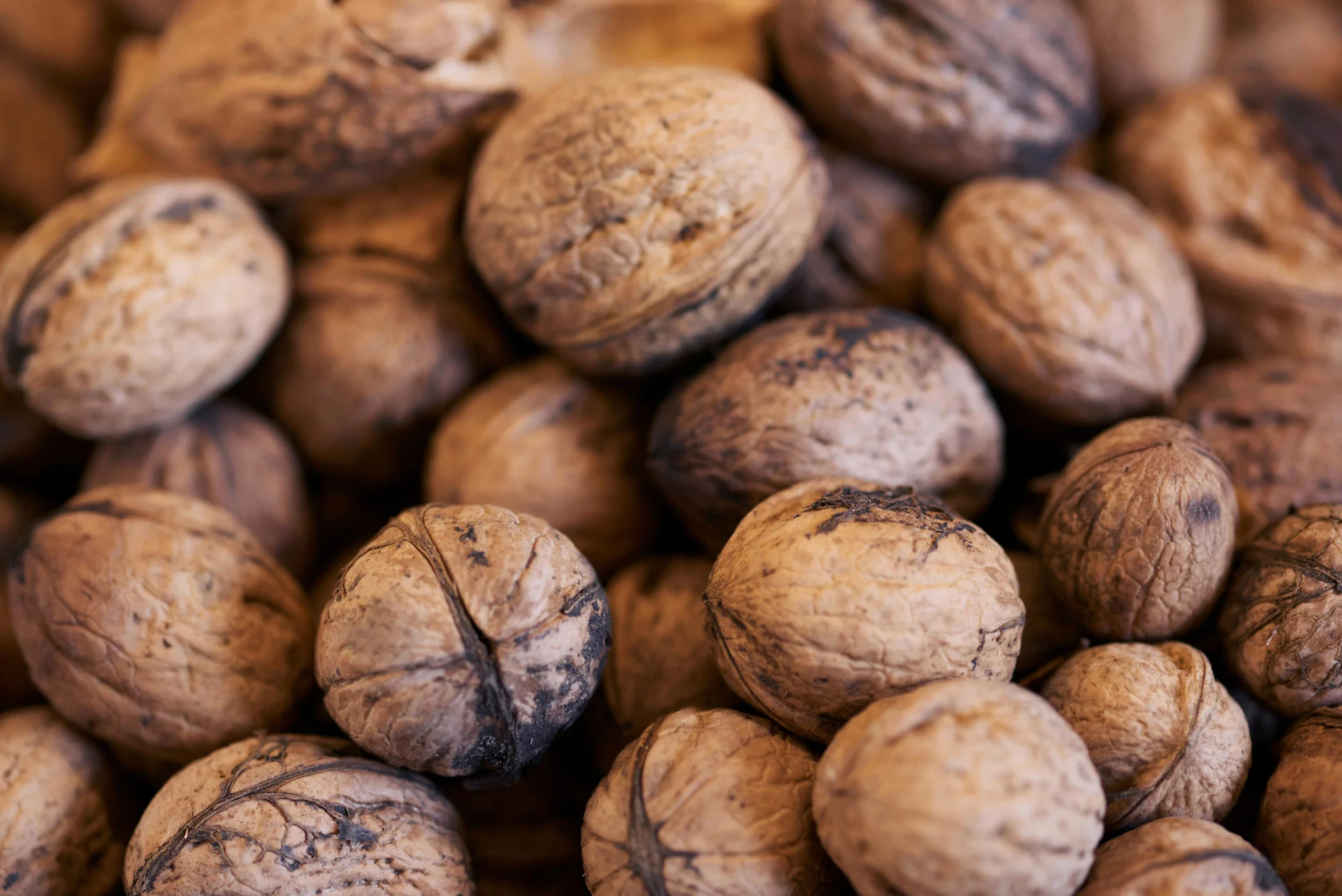
Around 60% of shelled hazelnuts traded on the world market come from Turkey and are produced by a large number of small farmers (mostly in monocultures) and often harvested by migrant workers.
About 80% of the almonds produced worldwide come from California (USA), where most farms are family-owned. The cultivation of almonds takes place on large monocultures and is highly technologised and professionalised.
Seeds and nuts are an important part of a balanced diet and a good source of healthy fats, proteins, vitamins and minerals. In addition, the production of nuts creates many jobs worldwide. However, the cultivation and processing of seeds and nuts can be associated with negative effects on people and the environment. Non-transparent supply chains often make it difficult to solve problems, as these extend across many countries and stakeholders. The following are the key challenges.
Biodiversity, climate and water – agricultural practices such as the use of fertilisers and pesticides pose environmental challenges. The production of these products requires a lot of energy and non-renewable resources, which contributes to climate change. The spread of fertilisers on fields can lead to unwanted nutrient leaching and groundwater pollution.
Monocultures have a negative impact on soil, biodiversity and the climate. They destabilise ecosystems, make them more vulnerable to disruption and reduce their ability to adapt. Monocultures require increased use of fertilisers and pesticides, which reduces soil fertility and can have negative environmental impacts. They also provide little living space for plants and animals, which promotes the loss of biodiversity.
Particularly in almond farming in California, industrial bee pollination endangers bee health and poses risks to ecosystems. Water use in agriculture can degrade ecosystems and lead to a reduction in freshwater resources. These aspects highlight the need for more sustainable practices and careful use of natural resources in agriculture.
Food waste – diseases, unfavourable harvest times or improper handling contribute to food waste in the field, which in turn leads to inefficiencies in the production, use and trade of food.
Working conditions and human rights – working conditions on plantations and factories for seeds and nuts are sometimes highly challenging: low wages, inadequate occupational health and safety, child and forced labour, and social discrimination are some of the difficulties.
In the case of seeds and nuts, our focus is on expanding the range of certified products (Rainforest Alliance, Fairtrade Max Havelaar or organic). Specific procurement standards are in place for the various product ranges. For example, all Turkish hazelnuts for the bakery store must be certified with the Rainforest Alliance label.
We also promote transparency in our supply chains by procuring our raw materials through direct relationships in the countries of origin wherever possible and by carefully selecting our suppliers based on sustainability criteria.
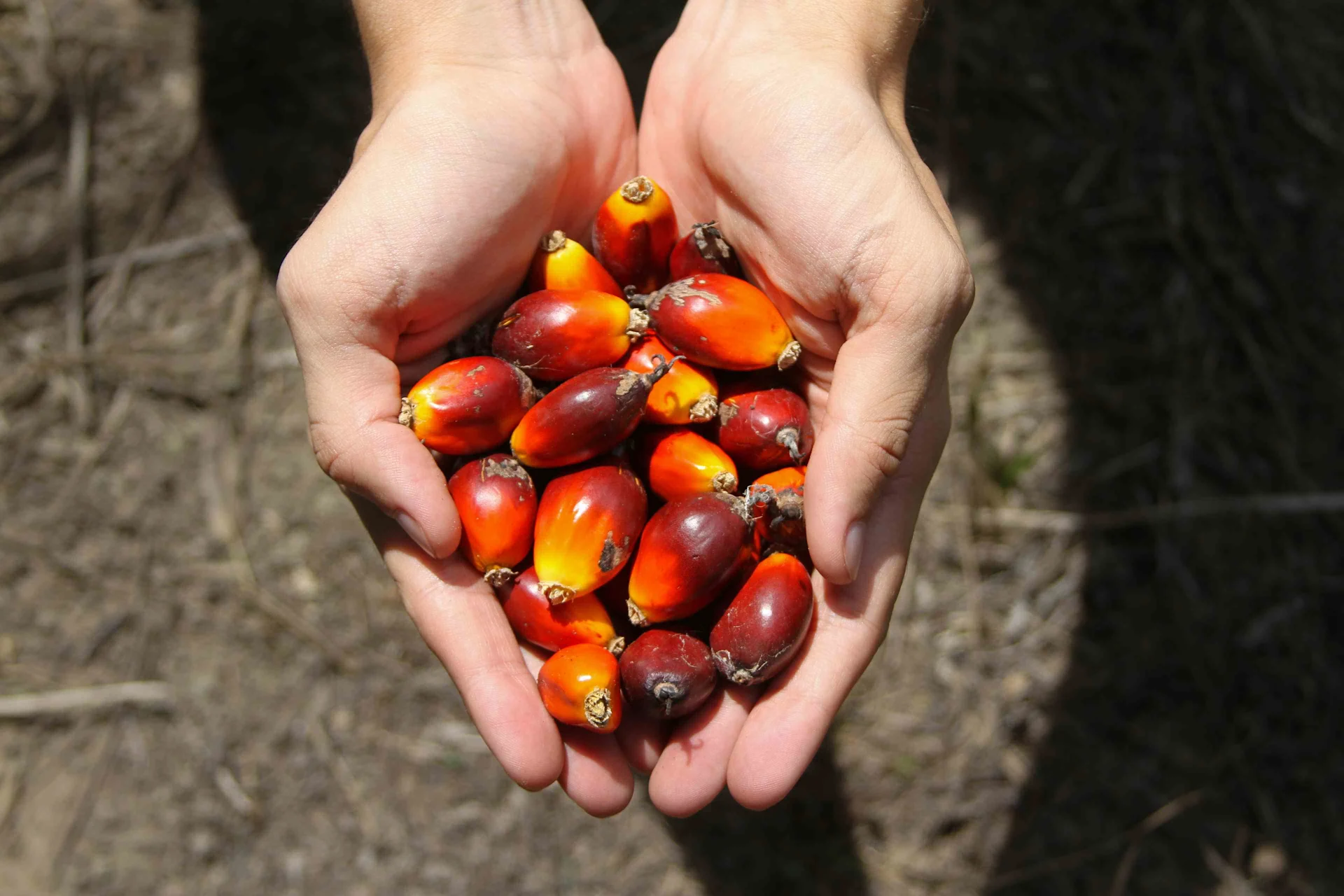
Palm oil is the most important vegetable oil in the world. It is obtained from the pulp of the oil palm, whereby the pulp is processed into palm oil and the seeds into palm kernel oil (one fruit contains around 90% palm oil and 10% palm kernel oil). Oil palms grow near the equator in Asia, Africa and Latin America, although around 85% of the world’s palm oil comes from Indonesia and Malaysia. Europe is responsible for around 10% of palm oil consumption, Switzerland for 0.03%, although imports and consumption have been declining for ten years and 99% is already RSPO or organic certified. Around 30% of Swiss palm oil imports come from Malaysia and the Solomon Islands, while other important countries of origin include the Ivory Coast and Colombia.
While imports into Switzerland are declining, global production and consumption of palm oil is increasing rapidly: in the last 20 years, global demand for palm oil has almost quadrupled, making it the most produced oil in the world, followed by soybean, rapeseed and sunflower oil.
The effects of the rapidly increasing demand for palm oil on the economy, the environment and people are manifold.
Rural development – in many tropical countries, palm oil production has driven rural development and is an important source of income for more than 7 million people. Although the areas under smallholder cultivation are small compared to industrial plantations, small-scale production accounts for around 40% of the total area under palm oil cultivation in Malaysia and Indonesia alone.
Yield – at 3.3 tonnes of oil per hectare, palm oil is five times as productive as rapeseed, coconut or sunflower. To replace palm oil, significantly larger areas would have to be planted with other oilseeds, thereby merely shifting the problem.
Biodiversity and climate – not only in Indonesia and Malaysia, but also in other tropical regions such as Papua New Guinea, Colombia, Nigeria and West Africa, valuable forests are often cleared to make way for palm oil plantations. This results in the loss of habitat for numerous animal and plant species. In addition, large quantities of greenhouse gases are released through slash-and-burn agriculture and the drainage of peat forests, leading to land usage conflicts.
The use of pesticides on palm oil plantations poses environmental and health challenges, including environmental impacts such as soil and water pollution, health risks for workers and communities, damage to biodiversity, development of resistant pests, and long-term soil damage.
Working conditions and human rights – palm oil production is sometimes associated with significant social challenges. Workers on palm oil plantations often earn insufficient wages to meet their basic needs.
Many plantations neglect adequate safety measures and occupational health standards, which can lead to health problems and accidents.
In some cases, children are forced to work on the plantations, which not only violates international standards, but also impairs the education and development of these children. Forced labour is another serious problem and violates basic human rights.
Workers may have limited opportunities to unionise and stand up for their rights, further weakening workers’ bargaining power.
Practices on some plantations can lead to environmental damage that not only affects community livelihoods, but can also lead to conflict between companies and the local population.
Sustainable palm oil involves environmental and social criteria being taken into account both in the cultivation of oil palms and in their processing. This includes fair working conditions and the protection of land usage rights. It also means protecting valuable areas such as intact rainforests and peat bogs from the expansion of plantations.
For all Migros Group companies, any palm oil and palm kernel oil used in our products must meet the criteria of the Roundtable on Sustainable Palm Oil (RSPO). This requirement is part of our Migros Group standards and an integral element of our strategic controlling processes. We confirm that the RSPO Shared Responsibility requirements are being implemented in our palm oil-related activities.
Stricter requirements in cooperative retailing – we are even stricter in cooperative retailing, where we ensure that our palm oil comes from sustainable sources by only using RSPO-certified palm oil from segregated supply chains. This means that its origin can be traced.
In 2004, Migros and its partners (including the WWF) founded the Roundtable on Sustainable Palm Oil (RSPO), now the most important certification standard for palm oil. Rules, processes and criteria for the cultivation of sustainable palm oil were developed to prevent the destruction of rainforests and human rights violations as well as to strengthen the ecology of cultivation. In November 2018, the requirements for RSPO certification were tightened.
Migros is also a founding member of the Swiss Palm Oil Network. All the stakeholders involved in the network have been working on environmental and social improvements in the palm oil value chain for years. In addition to the certification, strategies and objectives are being developed to make palm oil production more sustainable. These include, for example, stricter monitoring of the use of pesticides on site and the establishment of greenhouse gas balances for the plantations.
An emerging project – the majority of the palm oil processed within Migros Industrie comes from the Solomon Islands. In cooperation with the importer, we are committed to ecological and climate-friendly local palm oil production and to strengthening local communities. More about the project with our partner Earthworm Foundation.
Our social standards Unsere Sozialstandards
RSPO
Swiss palm oil network and fact sheets
RPOG
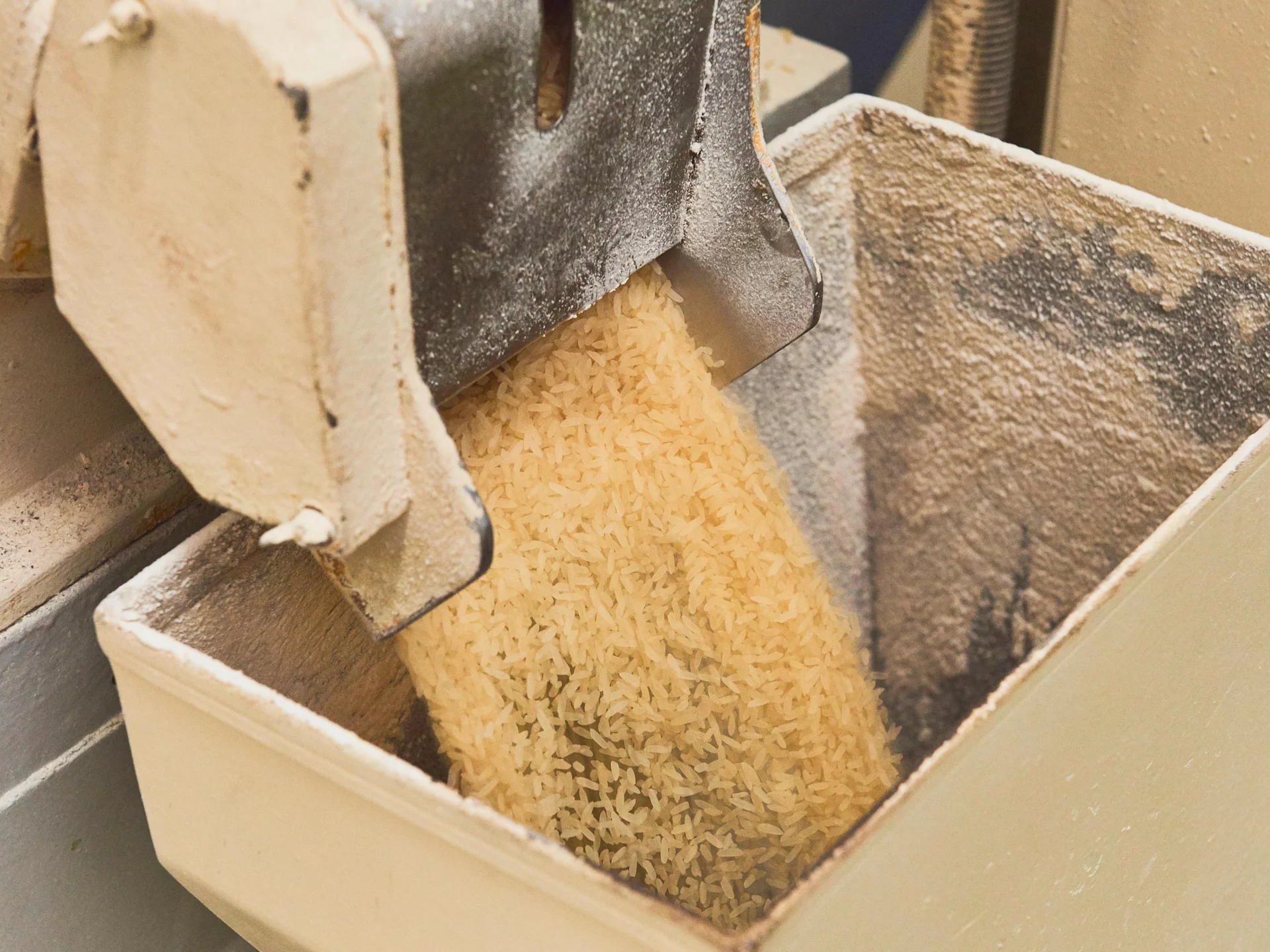
Rice is the staple food for around two thirds of the world’s population. Some 90% of the rice produced worldwide is grown in monocultures in Asia – around half of it in China. Rice is rich in carbohydrates and forms an important source of energy. Rice cultivation creates jobs for millions of people, especially in rural areas in developing countries. Rice has important cultural significance in many cultures and plays a central role in rituals, festivals and traditional cuisine. However, rice production is also associated with various challenges for people and the environment.
Biodiversity, climate and water – the cultivation of rice requires considerable landmass, which can lead to deforestation or the conversion of natural ecosystems. Rice cultivation is dominated by monoculture farming, which can have a negative impact on soil, biodiversity and the climate. The soil loses nutrients and fertility because it has to continuously nourish the same plant. As a result, it needs more artificial fertiliser to remain productive. Monocultures are also more susceptible to pests and diseases, therefore requiring more pesticides, which can be harmful to the environment and health. Monocultures also provide poorer protection for the soil against erosion and (ground) water pollution. The soil can be eroded more easily, and the released fertiliser and pesticides can pollute the groundwater.
The production of fertilisers and pesticides requires a lot of energy and the use of non-renewable raw materials. They can also endanger the health of farmers and people who live near the fields.
Wet rice cultivation, in which the fields are flooded, consumes a great deal of water. Up to 5,000 litres of water are needed to grow one kilogram of rice. Microorganisms in the soil of flooded rice fields are responsible for a considerable proportion of global methane emissions.
Working conditions and human rights – in some cases, working conditions in rice farms can be problematic, with low wages, unsafe working conditions and a lack of worker rights.
In cooperative retailing, we minimise our negative impact from rice cultivation through our procurement policy, the selection of raw materials and our product range structuring.
The main focus of our strategy is on expanding the range of certified products (Fairtrade Max Havelaar, organic). We also promote transparency in the supply chains by sourcing our rice through direct relationships in the countries of origin whenever possible and carefully selecting our suppliers based on sustainability criteria.
Climate-friendly rice cultivation in Thailand – to counteract the negative impact of rice on people and the environment, we are promoting an innovative method called rice intensification (SRI) in the province of Sakon Nakhon in eastern Thailand, as an example. This climate-friendly rice cultivation project is supported by the Migros Climate Fund and implemented by the myclimate foundation.
Rice grown in Ticino – we also offer regional rice from Ticino, which is grown using dry cultivation with irrigation. This cultivation method emits significantly less methane than conventional wet rice cultivation. The disadvantages are the limited supply and the higher costs compared to conventionally grown rice.
Find out how we use more sustainable raw materials to create more sustainable products.